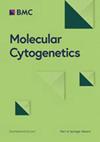Clinical outcomes of screen-positive genome-wide cfDNA cases for trisomy 20: results from the global expanded NIPT Consortium
IF 1.4
4区 生物学
Q4 GENETICS & HEREDITY
引用次数: 0
Abstract
Trisomy 20 has been shown to be one of the most frequent rare autosomal trisomies in patients that undergo genome-wide noninvasive prenatal testing. Here, we describe the clinical outcomes of cases that screened positive for trisomy 20 following prenatal genome-wide cell-free (cf.) DNA screening. These cases are part of a larger cohort of previously published cases. Members of the Global Expanded NIPT Consortium were invited to submit details on their cases with a single rare autosomal aneuploidy following genome-wide cfDNA screening for retrospective analysis. Clinical details including patient demographics, test indications, diagnostic testing, and obstetric pregnancy outcomes were collected. Genome-wide cfDNA screening was conducted following site-specific laboratory procedures. Cases which screened positive for trisomy 20 (n = 10) were reviewed. Clinical outcome information was available for 90% (9/10) of our screen-positive trisomy 20 cases; the case without diagnostic testing ended in a fetal demise. Of the nine cases with outcome information, one was found to have a mosaic partial duplication (duplication at 20p13), rather than a full trisomy 20. Only one case in the study cohort had placental testing; therefore, confined placental mosaicism could not be ruled out in most cases. Adverse pregnancy outcomes were seen in half of the cases, which could suggest the presence of underlying confined placental mosaicism or mosaic/full fetal trisomy 20. Based on our limited series, the likelihood of true fetal aneuploidy is low but pregnancies may be at increased risk for adverse obstetric outcomes and may benefit from additional surveillance.20 三体综合征全基因组 cfDNA 筛查阳性病例的临床结果:全球扩大的 NIPT 联合会的结果
在接受全基因组无创产前检测的患者中,20 三体综合征已被证明是最常见的罕见常染色体三体综合征之一。在此,我们描述了在产前全基因组无细胞(cf. )DNA 筛查中筛查出 20 三体综合征阳性病例的临床结果。这些病例是之前公布的更大病例群的一部分。全球扩大 NIPT 联合会的成员受邀提交他们在进行全基因组 cfDNA 筛查后发现的单个罕见常染色体非整倍体病例的详细信息,以便进行回顾性分析。研究人员收集了包括患者人口统计学特征、检查适应症、诊断测试和产科妊娠结果在内的临床细节。全基因组 cfDNA 筛查按照特定地点的实验室程序进行。对筛查出 20 三体综合征阳性的病例(n = 10)进行了复查。在筛查阳性的 20 三体综合征病例中,90%(9/10)的病例有临床结果信息;未进行诊断测试的病例以胎儿死亡告终。在 9 例有结果信息的病例中,有 1 例被发现患有马赛克部分重复(20p13 处重复),而不是完全的 20 三体综合征。研究队列中只有一例进行了胎盘检测,因此大多数病例无法排除胎盘嵌合的可能性。半数病例出现了不良妊娠结局,这可能提示存在潜在的局限性胎盘嵌合或马赛克/全胎儿 20 三体综合征。根据我们有限的系列研究,胎儿真性非整倍体的可能性很低,但妊娠不良产科结局的风险可能会增加,因此可能需要额外的监测。
本文章由计算机程序翻译,如有差异,请以英文原文为准。
求助全文
约1分钟内获得全文
求助全文
来源期刊

Molecular Cytogenetics
GENETICS & HEREDITY-
CiteScore
2.60
自引率
7.70%
发文量
49
审稿时长
>12 weeks
期刊介绍:
Molecular Cytogenetics encompasses all aspects of chromosome biology and the application of molecular cytogenetic techniques in all areas of biology and medicine, including structural and functional organization of the chromosome and nucleus, genome variation, expression and evolution, chromosome abnormalities and genomic variations in medical genetics and tumor genetics.
Molecular Cytogenetics primarily defines a large set of the techniques that operate either with the entire genome or with specific targeted DNA sequences. Topical areas include, but are not limited to:
-Structural and functional organization of chromosome and nucleus-
Genome variation, expression and evolution-
Animal and plant molecular cytogenetics and genomics-
Chromosome abnormalities and genomic variations in clinical genetics-
Applications in preimplantation, pre- and post-natal diagnosis-
Applications in the central nervous system, cancer and haematology research-
Previously unreported applications of molecular cytogenetic techniques-
Development of new techniques or significant enhancements to established techniques.
This journal is a source for numerous scientists all over the world, who wish to improve or introduce molecular cytogenetic techniques into their practice.
 求助内容:
求助内容: 应助结果提醒方式:
应助结果提醒方式:


